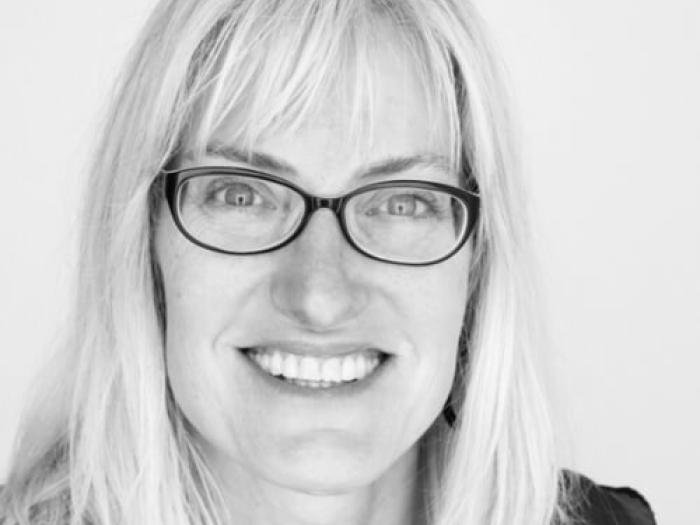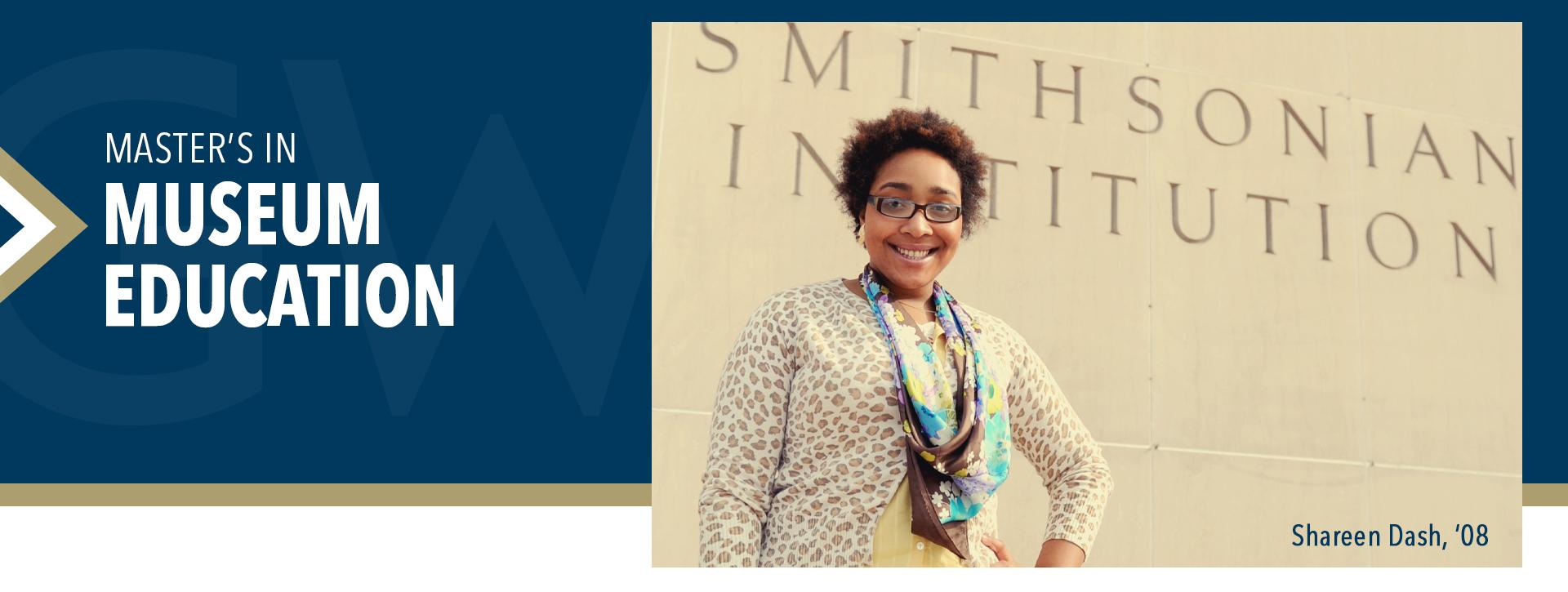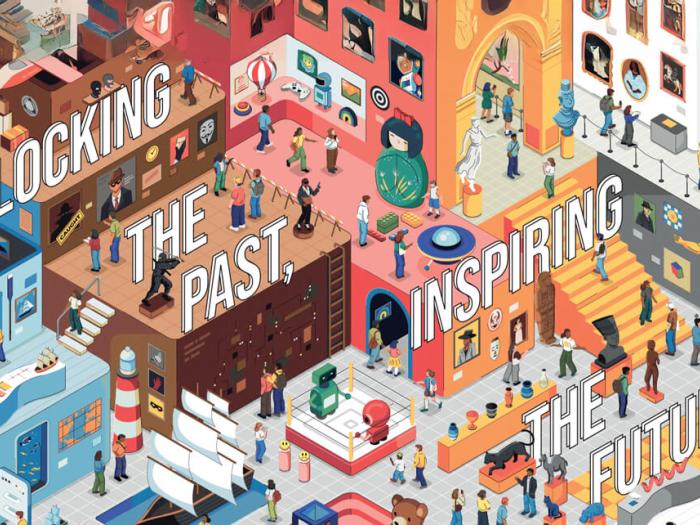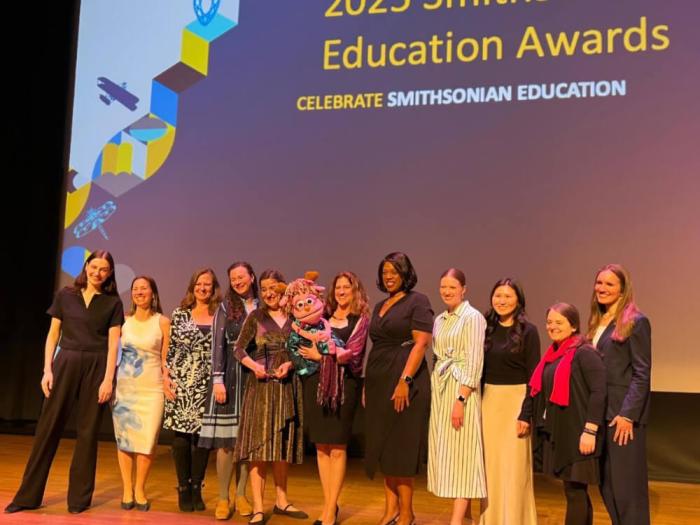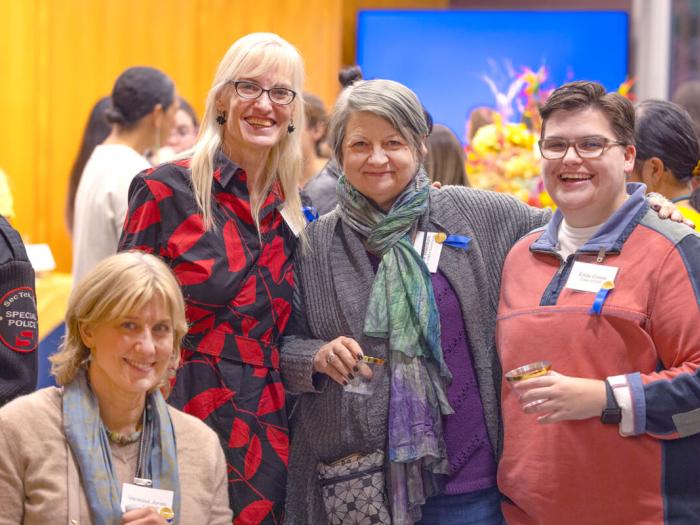Master's in Museum Education
Create Immersive Learning Experiences
Established in 1974 as the first program of its kind, the Master of Arts in Teaching in Museum Education leads the way for museums, and other cultural and natural heritage sites, to nurture a humane and just society. The program prepares leaders who facilitate distinctive learning opportunities for participants to engage powerfully with their lives, their communities, and the world.
Program faculty, who excel as practitioners committed to theory and practice, combine rigorous academic preparation with real-world application of museum education and leadership principles in environments as diverse and fascinating as the National Zoological Park, the International Spy Museum and the National Museum of African American History and Culture.
Experiential Learning
Students balance theory and practice with supervised fieldwork at world-class institutions where they build their skills and reputation as advocates for museum accessibility and accountability.
Leading Global Peer Network
Our alumni network is extensive, with graduates working as leaders in museums all around the world. Develop skills alongside a diverse cohort from around the globe who bring a wide range of professional experience, skills and knowledge.
Streamlined Time to Completion
This full-time, 4-semester, in-person program allows you to earn a master's degree in 14 months; start in June and graduate the following August.
The GW Advantage
There is no better place to examine museum education than in the heart of our nation's capital. Washington, D.C. is unmatched when it comes to the number of world-class museums it has to offer. With close proximity to the White House, the Smithsonian Institution, art galleries, national monuments, and other diverse cultural and natural sites, there are unparalleled opportunities to learn and work.
At GW, you will prepare to advance the public service mission of museums and shape them into distinctive learning environments with and for a multicultural society.
Degree Awarded:
Master of Arts in Teaching in the Field of Museum Education
Department:
Educational Leadership
Course Delivery:
Foggy Bottom Campus
Program Entry:
Summer
- Curriculum Requirements
The following requirements must be fulfilled: 33 credits, including 27 credits in required courses and 6 credits in elective courses.
Code Title Required EDUC 6701 Museums as Institutions I: Fundamentals EDUC 6702 Facilitating Museum Learning I: Fundamentals EDUC 6703 Co-Creating with Museum Participants EDUC 6704 Facilitating Museum Learning II: Field Placement and Seminar (taken for 6 credits) * EDUC 6705 Museums as Institutions II: Field Placement and Seminar (taken for 6 credits) ** EDUC 6706 Evaluating Museum Learning EDUC 6707 Museum Proposal Writing Electives 6 credits in elective courses. Elective courses should be selected in consultation with the program advisor. *EDUC 6704: Field Placement and Seminar (taken for 6 credits in the first year of the program) includes supervised placement in local educational institutions. The on-campus seminar focuses on human development and learning theory. Placement requires a commitment of 16 hours per week.
** EDUC 6705: Field Placement and Seminar (taken for 6 credits in the first year of the program) includes a supervised placement in area museums and related organizations where students carry out projects in cooperation with the site. The on-campus seminar includes presentations by leading practitioners. Placement requires a commitment of 32 hours per week. Restricted to museum education students. Prerequisites: EDUC 6701, 6702, 6703 and 6704.
- Program Outcomes
- Proficiency in Facilitating Engaging Museum Learning Experiences
- Students develop the skills to design, implement, and refine educational programming tailored to diverse museum audiences, enhancing visitor engagement and knowledge retention.
- Expertise in Museum Operations and Institutional Roles
- Graduates gain a deep understanding of the foundational structures and roles of museums as institutions, equipping them to navigate and contribute to organizational decision-making and strategy.
- Collaborative and Inclusive Program Development
- The program emphasizes co-creation with museum participants, fostering skills in collaboration, cultural responsiveness, and stakeholder engagement to create relevant and meaningful museum experiences.
- Real-World Application Through Field Placements
- The intensive field placements offer hands-on experience, allowing students to apply theoretical knowledge in professional settings, develop industry networks, and gain practical expertise.
- Competency in Evaluation and Proposal Writing
- Graduates are equipped with the ability to assess the impact of museum learning programs and write compelling proposals, enabling them to secure funding and support for museum initiatives.
- Proficiency in Facilitating Engaging Museum Learning Experiences
Apply Now
GSEHD’s Office of Admissions invites you to apply for a spot in our program. Please review the following admission and financial information.
Ready to take the next step in your career? Review our step-by-step guide to applying to GSEHD >
To learn more about the program, admission process, and upcoming events, please connect with the GSEHD Admissions Team at askdel![]() gwu [dot] edu (askdel[at]gwu[dot]edu) or 202-994-9283.
gwu [dot] edu (askdel[at]gwu[dot]edu) or 202-994-9283.
| Apply Now | Schedule Meeting with Admissions Coach |
To be considered for admission, applicants must submit the online application form as well as the following required supporting documents. There is no application fee.
- Prerequisite: Bachelor's Degree
- Resume
- Statement of Purpose: In an essay of 500 words maximum, please tell us why you want to be a museum educator.
- Two Letters of Recommendation
- Transcripts from all previously attended colleges or universities
*Additional application requirements may exist for international applicants.
Applications are now being accepted for Summer 2026. We encourage you to apply as early as possible.
Application Timeline Summer Priority Deadline Nov 1 Round 1 Deadline Dec 1 Round 2 Deadline Jan 15 Round 3 Deadline March 1
For more information or to inquire about the next admissions cycle, contact the GSEHD Admissions Team at askdel gwu [dot] edu (askdel[at]gwu[dot]edu) or 202-994-9283.
gwu [dot] edu (askdel[at]gwu[dot]edu) or 202-994-9283.
Tuition & Financial Aid
We know embarking upon graduate school is a big decision - due in part to the costs of attending. At GW, we understand the time and thought behind making graduate school work for you. Please take a moment to learn more about the options and opportunities available to help fund your graduate education.
Graduate tuition is charged per credit hour, unless otherwise noted. Rates vary by program and location.
The tuition rate* for the Master's in Museum Education program is $1,960 per credit hour.
This program requires 33 credits.
Please note: Additional fees may apply for international students, late fees, etc. Current tuition rates may be updated during the year.
*Summer 2025, Fall 2025 and Spring 2026
Scholarships are available to eligible admitted students. Review eligibility requirements and learn more about funding your education >
I chose this program because it has blazed the trail of professionalizing the field of museum education as evidenced by the strength, reach, and impact of its extensive alumni network. It provided a solid foundation in museological and educational theories combined with practical, real-world experience working in museums and other educational organizations. In addition, the sheer number of exceptional museums in the D.C. area and the incredible museum professionals that students get to meet, dialogue, and work with are real strengths of this program. It really challenged and expanded my knowledge, skills, and abilities as a museum educator.
WENDY NG ('06)
Principal Owner and Consultant, Twin Muses Consulting Services
Master of Arts in Teaching in Museum Education
Career Outlook
With the assistance of a strong alumni base and valuable relationships with local professionals, 95 percent of the Museum Education Program’s graduates from the past 5 years currently hold museum education and other lifelong learning-related positions. They most often serve as directors of education, with some rising to the position of museum director.
- Museum Ed Career Opportunities
-
Graduates currently hold museum education and other cultural and natural heritage-related positions in the US and around the world. Alumni have worked in Spain, Cambodia, Israel, Finland, Brazil, Japan, Canada, Korea, Botswana and Costa Rica as:
- Museum Director
- Education Director
- Education Strategist
- Education Initiatives Manager
- Director/Manager of Access Initiatives
- Development Officer
- Docent Coordinator
- Director/Curator of Education & Public Programming
- Community-relationship Coordinator
- Event Planner
- Interpretation Specialists
- Members of the board for museums
- Museum Program Evaluators
- Vice President of Learning and Engagement
- Potential Employment Settings
-
Our graduates qualify for positions in art, history, science or children’s museums; zoos; aquariums and historical societies or sites. Our alumni also hold positions in professional associations, government agencies, private foundations, schools, and universities.
Alumni are currently employed in the following museums and other informal learning environments:
- American Museum of Natural History (New York)
- Museum of Flight (Seattle)
- Fort Concho National Historic Site (Texas)
- United States Holocaust Memorial Museum (DC)
- Adler Planetarium (Chicago)
- Historic New England (Boston)
- United States Marshals Museum (Arkansas)
- Association of Science-Technology Centers (DC)
- Peoria PlayHouse Children's Museum (Illinois)
- Intrepid Sea, Air, and Space Museum (New York)
- Bullock Texas State History Museum (Austin)
- Monterey Bay Aquarium (California)
- Phipps Conservatory and Botanical Gardens (Pittsburgh)
- John F. Kennedy Presidential Library (Boston)
- Anchorage Museum (Alaska)
- Gettysburg National Military Park (Pennsylvania)
- Arizona State Museum/University of Arizona (Tucson)
- Gadsby's Tavern Museum (Virginia)
- Seattle Children’s Museum (Washington)
- Intrepid Sea, Air, and Space Museums (New York)
- Museum of the Rockies (Montana)
- National Museum of Japanese History (Japan)
- Phipps Conservatory (Pennsylvania)
- US Holocaust Memorial Museum (DC)
- Department of Tourism (Kentucky)
- Montgomery Museum of Art (Alabama)
- Academy of Museum Motion Pictures (California)
- US Marshals Museum (Arkansas)
Museum Change Agents
Making the World a Better Place
CELEBRATING THE TRANSFORMATIVE IMPACT OF THE GW MUSEUM EDUCATION PROGRAM OVER ITS FIFTY-YEAR HISTORY
In this illuminating collection, alumni spanning five decades share their personal anecdotes and professional insights, revealing the diverse ways they have tackled pressing issues, from environmental awareness to social justice, leaving an indelible mark on the national learning landscape. Beyond alumni reflections, Museum Change Agents features contributions from museum thought leaders, offering insights into the current and future direction of museum practice.
